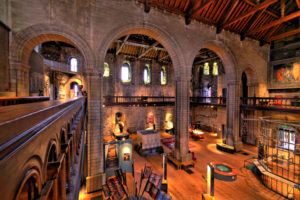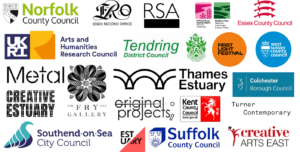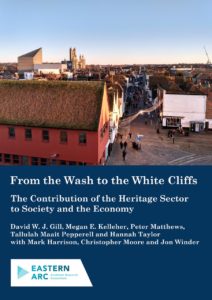Heritage and Culture Network
 The East and Southeast of England are rich in both built, cultural and natural heritage. Their long histories of trade and transport, defence and warfare, migration, pilgrimage and pleasure have meant that the regions have a significant number of heritage assets. Many of these benefit local communities economically, but also give a sense of identity and pride to them, and as such could play an important part in levelling-up areas of social and economic deprivation.
The East and Southeast of England are rich in both built, cultural and natural heritage. Their long histories of trade and transport, defence and warfare, migration, pilgrimage and pleasure have meant that the regions have a significant number of heritage assets. Many of these benefit local communities economically, but also give a sense of identity and pride to them, and as such could play an important part in levelling-up areas of social and economic deprivation.
The Eastern Arc Heritage and Culture Network (HCN) has been established to act as a catalyst for joint work between academics, research and external stakeholders, including local authorities, museums, archives, galleries and other organisations. The Network meets regularly to hear about ongoing projects, funding opportunities, and visitor trends, amongst many other topics. Read some brief notes from previous seminars here.
It’s a growing network of over 40 organisations, and new members are encouraged to join. If you would like to find out more, contact us.
Terms of reference
The Eastern Arc Heritage and Culture Network (HCN) has two broad aims.
- To be an interdisciplinary and intersectoral research forum to facilitate knowledge exchange, joint working and sharing of best practice. Through the network members can:
-
-
- Understand the wider context for those working in allied areas within the region.
- Share concerns, queries, knowledge, and insights
- Develop collaborations with other members, which may lead to:
- Joint projects
- Funding applications
- Events, including symposia, conferences and workshops
- Position statements and policy papers
- Research publications
- Public engagement
- Mentoring within and between sectors.
-
- To complement, support and work in partnership with other networks with which it may share geographic or thematic interests, such as the South East Creative Economy Network, the South East Cultural Innovation Forum, and Norfolk and Suffolk Culture Board.
To read our terms of reference in full, click here.

Members come from a huge range of organisations, some of which are shown here.
Challenges and opportunities for heritage in the Eastern Arc region
 In 2022 a team led by Professor David Gill (honorary professor at UEA and Kent) undertook research with the Royal Society of Arts (RSA) to look at the contribution of heritage to the EARC region, and the threats it faces.
In 2022 a team led by Professor David Gill (honorary professor at UEA and Kent) undertook research with the Royal Society of Arts (RSA) to look at the contribution of heritage to the EARC region, and the threats it faces.
The report looks at the economic benefits of heritage through such avenues as the National Lottery Heritage Fund (NLHF), and the jobs created in the area. It alos identified the social benefits, including the development of health and well-being; pride in place; digital connectivity; education and skills.
However, it also identifies significant threats. Coastal heritage across the region is facing the threat of the climate crisis and assets are being lost due to coastal erosion and rising sea levels, and heritage and cultural property crime is impacting the long-term sustainability of our internationally important heritage assets.
To find out more, download the report for free here.
Areas of focus
The Heritage and Culture Network will build its work around three areas of strategic strength for the EARC, as well as creating a fourth area in providing a service to external stakeholders to help advocate and make the case for the value of heritage and culture within the region.
-
The value of heritage to both physical and mental health is increasingly being recognised and evidenced. Pennington et al (2019) analysed 75 recent studies, which showed the ‘positive impacts [of heritage] on individual wellbeing, including outcomes such as increased confidence, social connectivity and life satisfaction [as well as] positive effects on community wellbeing, including outcomes on social relationships, sense of belonging, pride of place, ownership and collective empowerment.’
Reilly, Nolan and Monckton (2018) outlined a number of ways in which heritage can benefit individuals, including the physical activity needed to visit heritage sites and museums, the mindfulness and perspective engendered in contemplating the past, the development of skills and social interaction in volunteering, and a sense of wellbeing through pride in place and community cohesion.
The Eastern Arc HCN seeks to build on this. Gill and Ward have already responded to the Thames Estuary Levelling-Up Atlas (2021) with a consideration of how heritage can contribute to well-being. The Arc will continue this work, connecting those working on health and wellbeing within the EARC universities, public health officers in local authorities, Creative Health Associates within the integrated care boards, and heritage organisations, to better understand the link between heritage and health, and actively develop projects that enable people to benefit from heritage within the region.
-
Our changing climate is putting natural and cultural heritage at risk.This is a particular challenge for the Eastern Arc area: Gill et al (2022) noted ‘the EARC region’s coastline is particularly rich in heritage value [which is] vulnerable to rising sea levels.’
Defra (2018) has recognised the importance of proactively addressing this challenge. ‘Initiatives to protect and improve our natural world and cultural heritage are acts of stewardship by which we discharge our debt to it, and so are moral imperatives in themselves, but they are also economically sensible.’
The Eastern Arc HCN will work to identify and address the climatic challenges to our natural and cultural heritage, as well as understanding how new techniques and technologies can help to preserve our heritage assets and repurpose them for a changing world.
-
In its 2021 report, Using Digital Technologies to Innovate in Heritage Research, Policy and Practice, Unesco recognised that ‘digital technologies can provide new ways to document, preserve and interpret different forms of heritage, and to transmit them to current and future generations.’
As with Sustainable Futures, the Eastern Arc HCN will explore the challenges and opportunities of a rapidly changing world. From the integration of immersive technologies to AI, from digitising archives to using phone-based apps to engage with museums, heritage assets and other sites, we will seek to understand how new technologies and skills can be used creatively to open up our history to those who haven’t had the opportunity to access it before.
-
In a time when the cost of living crisis is affecting the majority of the population, central government, local authorities, charities and funders are having to make difficult decisions about prioritising their spending.
Eastern Arc will maintain and interpret data relating to heritage and culture across the EARC region so that we can support heritage and culture organisations, county councils and local authorities to take evidence based decisions.
